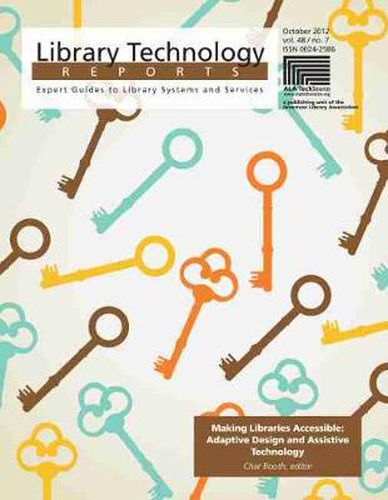Readings Newsletter
Become a Readings Member to make your shopping experience even easier.
Sign in or sign up for free!
You’re not far away from qualifying for FREE standard shipping within Australia
You’ve qualified for FREE standard shipping within Australia
The cart is loading…






This title is printed to order. This book may have been self-published. If so, we cannot guarantee the quality of the content. In the main most books will have gone through the editing process however some may not. We therefore suggest that you be aware of this before ordering this book. If in doubt check either the author or publisher’s details as we are unable to accept any returns unless they are faulty. Please contact us if you have any questions.
As a provider of public space and digital content, your library is duty-bound to promote equitable access to all users, regardless of whether they use assistive technology. In this issue of Library Technology Reports, editor Booth makes the case that that attention to the core principles of consistency, flexibility, and simplicity go hand in hand with libraries’ commitments to open information and accessibility. Even when staffing levels or resources aren’t ideal, libraries can substantially improve the experience of people with disabilities. In this issue, expert contributors address standards, spaces and services, devices, websites, and collections, offering advice on:
Assistive technology products, including screen readers, literacy software, and speech input E-books and e-readers for users with print disabilities, with charts comparing accessibility features of the most common e-readers The nuts and bolts of using HTML, CSS, Javascript, or JQUERY for accessibility Best practices for evaluating vendor database compliance
$9.00 standard shipping within Australia
FREE standard shipping within Australia for orders over $100.00
Express & International shipping calculated at checkout
This title is printed to order. This book may have been self-published. If so, we cannot guarantee the quality of the content. In the main most books will have gone through the editing process however some may not. We therefore suggest that you be aware of this before ordering this book. If in doubt check either the author or publisher’s details as we are unable to accept any returns unless they are faulty. Please contact us if you have any questions.
As a provider of public space and digital content, your library is duty-bound to promote equitable access to all users, regardless of whether they use assistive technology. In this issue of Library Technology Reports, editor Booth makes the case that that attention to the core principles of consistency, flexibility, and simplicity go hand in hand with libraries’ commitments to open information and accessibility. Even when staffing levels or resources aren’t ideal, libraries can substantially improve the experience of people with disabilities. In this issue, expert contributors address standards, spaces and services, devices, websites, and collections, offering advice on:
Assistive technology products, including screen readers, literacy software, and speech input E-books and e-readers for users with print disabilities, with charts comparing accessibility features of the most common e-readers The nuts and bolts of using HTML, CSS, Javascript, or JQUERY for accessibility Best practices for evaluating vendor database compliance